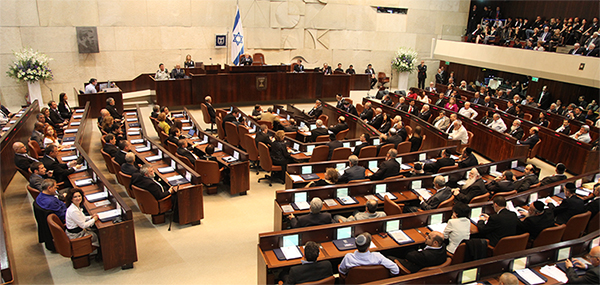Filistinlilere ‘siz hep yabancı kalacaksınız’ mesajı


Binyamin Netanyahu’nun partisi Likud tarafından Knesset’e sunulan İsrail Ulus- Devlet Yasası, 8 Mayıs’ta mecliste yapılan ilk oylamada 41’e karşı, 48 oyla kabul edildi. Likud Partisi’nden milletvekili Avi Dichter tarafından sunulan ve ilk oylama kabul edilen tasarının tekrar meclise gelmesi için 60 günlük süre bulunuyor. İki ay sonra meclise gelecek olan tasarı, yasalaşması için iki kere daha oylanacak. Adalet Bakanı Ayelet Shaked, Knesset oylaması sonrasında yaptığı açıklamada, “İki ay içinde Hükümet tarafından tasarının tüm koalisyon üyeleri için daha kabul edilebilir bir versiyonunun hazırlanacağını ve meclise sunulacağını” açıklamıştı. Fakat Başbakan Netanyahu, 14 Mayıs’ta yaptığı açıklamada “60 günlük sürenin beklenmemesi ve tasarının olabildiğince çabuk geçmesi için” koalisyon partisi liderlerine çağrı yaptı.
Oylama sırasında Arap milletvekilleri Hanin Zouabi ve Abd Al Hakeem Haj Yahya ‘oturumu böldükleri’ gerekçesiyle meclisten atılırken vekil Jamal Zahalka, yasa tasarısını ‘apartheid bir yasa’ olarak tanımladığı gerekçesiyle Knesset’ten çıkartıldı.
Tartışmalara konu olan yasa tasarısı, İsrail’in ‘Yahudi toplumunun anayurdu’ olduğu ve kendi kaderini tayin hakkının sadece Yahudi toplumuna dair bir statü olduğu hükmünü içeriyor. Arapçanın resmi dil statüsünden çıkarılması hükmünün de yer aldığı tasarı, ülkenin beşte birini oluşturan, 1,7 milyonluk Filistinli nüfusa yönelik ayrımcılığı yasallaştıracağı endişesiyle sert eleştirilerin odağına oturdu. Anayasası bulunmayan İsrail’de, tasarının kabul edilmesi halinde anayasal statüde bir metin olacağı ifade ediliyor.
Kurulduğu 1948’den beri İsrail devleti kendini, ‘Yahudilerin devleti’ olarak tanımlıyor. 1950’de kabul edilen ‘Dönüş Yasası’ da İsrail’e sadece Yahudilerin göç etmesine ve vatandaşlık almasına izin veriyor. Ülkedeki sivil toplum örgütleri, Filistinlilere yönelik pek çok ayrımcı yasa olduğuna dikkat çekse de oylanan Ulus Devlet Yasası’nın bu uygulamalara anayasal düzlemde meşruiyet vereceği yönünde endişeler bulunuyor. Al Jazeera’ya konuşan insan hakları avukatı Ali Haider, yasanın kabul edilmesi halinde İsrail vatandaşı olmamasına rağmen herhangi bir Yahudi bireyin, İsrail’de yaşayan Filistlinlik bir vatandaşa göre daha fazla hakkı olacağına dair endişe taşıdıklarını belirtiyor.

Brooklyn College’de Tarih bölümünde Yardımcı doçent olarak görev yapan, Türkiye, İsrail-Filistin ilişkileri ve Ortadoğu konusunda çeşitli mecralarda makaleler yayımlayan Louis Fishman’la ulus devlet yasasının ne anlama geldiği ve yankıları üzerinde konuştuk. Fishman, ‘utanç verici’ olarak tanımladığı yasa tasarısının, sağ eğilimli İsrail nüfusunun mevcut durumundan faydalanmak amacıyla hazırlandığını düşünüyor ve ekliyor: “Yüzde 20'yi oluşturan İsrail vatandaşı Filistinliler’e verilen mesaj açık ve net: Burası bizim memleketimiz ve sizler yurttaş olsanız bile hiçbir zaman ulus-devletin ayrılmaz bir parçası olmayacaksınız; başka bir deyişle, hep yabancı kalacaksınız.”
Tasarı için yapılan ilk oylamanın ardından Knesset'te diğer oturumlar ne zaman yapılacak? Sonraki oylamalar için tahminleriniz var mı?
Sürecin nasıl devam edeceğini bekleyip göreceğiz. İlk oylamalar ‘nabız yoklama’ niteliğinde. Eğer yeterince muhalefet olursa tasarı rafa kalkabilir. Bu yasanın beş yıldır hazırlanma aşamasında olduğunu ve çok zor şartlar altında ortaya çıktığını da unutmayalım.
Bu tasarının birçok çelişki barındırdığını söyleyebiliriz sanırım. Genel olarak tasarıya dair yorumunuz nedir? Bazı köşe yazarları tasarıyı ‘yeni bir apartheid rejimi biçimine geçiş’ olarak tanımlarken, bazıları da Arap azınlığın statüsünü eleştiriyor. Israil'in resmi dilinin İbranice olması teklifi de ayrıca tartışmalı. Bu bağlamda, tasarıyla ilgili ne düşünüyorsunuz?
Daha geniş açıdan ele alırsak bu tasarı tamamen gereksiz. Yahudiler zaten net bir şekilde çoğunluk konumundalar ve İbranice de fiili olarak resmi dil, ardından da ikinci dil olarak Arapça geliyor. Bu yüzden akla şu soru geliyor, neden şimdi? Burada temel mesele, Yahudilerin bir Yahudi devletinin nasıl olmasına gerektiğine dair geniş çaplı tartışmaları. Açık liberal bir toplum mu olmalı, yoksa devletin Yahudi olduğu yasayla güvence altına mı alınmalı? Yüzde 20'yi oluşturan İsrail vatandaşı Filistinliler için bu yasa ırkçı. Okullarında Arapça öğretilmeye devam edilecek (bu Türkiye'de Kürtçe eğitim meselesinden epey farklı) ve dil açısından hayatlarında radikal bir değişik yaşanmayacak olsa da (çünkü zaten erken yaşta İbranice öğreniyorlar ve yüksek öğrenimin büyük bölümünde de İbranice öğrenmek zorunda kalıyorlar), verilen mesaj açık ve net: Burası bizim memleketimiz ve sizler yurttaş olsanız bile hiçbir zaman ulus-devletin ayrılmaz bir parçası olmayacaksınız; başka bir deyişle, hep yabancı kalacaksınız.
İsrail'in Batı Şeria'da doğrudan işgali ve Gazze'deki yarı işgali altında yaşayan Filistinler için bu yasa, hayatlarının hiçbir hak ve yasal yola başvurma imkanı olmadan gündelik olarak İsrail güvenlik güçlerinin kontrolü altında olduğu gerçeğini değiştirmeyecek. Başka bir deyişle bu yasa, kesinlikle sadece gerçek İsraillileri ve Filistin topraklarını işgal eden yerleşimcileri ilgilendiriyor. Bunlar göz önüne alındığında karşımıza çok daha zor bir tablo çıkıyor: İsrail vatandaşı Filistinliler, daha geniş bir adaletsizlik hiyerarşisinin bir parçası olarak kalacaklar.
Tasarının geçmesi durumunda anayasa muamelesi göreceğini söyleyebilir miyiz?
İsrail'in anayasası yok, temel kanunları var. Aslına bakarsanız, İsrail'in bir anayasanın olmamasının sebebi, Yahudiliğin özünün yasada nasıl tanımlanacağı meselesiyle ilgili. Bu bağlamda bu da bir ‘temel kanun’ olacak ve dolayısıyla da anayasal bir yanı olacak. Bunun temyiz mahkemesine taşındığını görmek de ilginç olacak. Yani bence ileride bu yasanın mahkemeye taşındığını göreceğiz.
Siyasi partiler tasarıyla ilgili neler söylüyor?
İşçi Partisi ve Meretz Partisi'ndeki pek çok kişi ve tabii en çok da Birleşik Arap Listesi tasarıya karşıyken, İşçi Partisi'nin tasarıyı destekleyen üyeleri de var. Bir de liberal değerlerle çelişmesinden ötürü Likud Partisi'nden tasarıya karşı olan az sayıda insan da var.
İsrail'deki sivil toplum kuruluşları tasarıyı nasıl yorumluyor? Belli bir eleştirel söylem olduğu söylenebilir mi?
STK'lar sert bir şekilde eleştiriyor olsa da bunun çetin bir mücadele olduğunu söyleyebiliriz.
Bu tasarının zamanlamasıyla ilgili ne düşünüyorsunuz?
Yıllar önce Knesset'te bu yasadan bahsedilemezdi bile. Sağ eğilimli İsrail nüfusunun mevcut durumundan faydalanmaya çalışan, gerici bir yasa bu. Ayrıca bu, sağcı hükümetlerinin uzatmalı varlığının statükoyu değiştirmede başarılı olduklarını da gösteriyor. Daha önce de söylediğim gibi bu yasa gereksiz ve utanç verici. Yalnızca devletin Arap yurttaşları için değil, özgürlük ve eşitliğe dayalı açık liberal bir İsrail için çalışan Yahudiler için de utanç verici.


